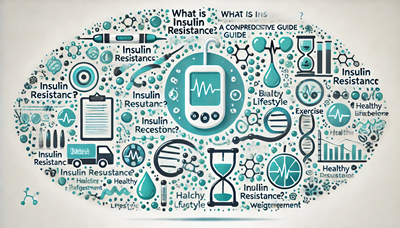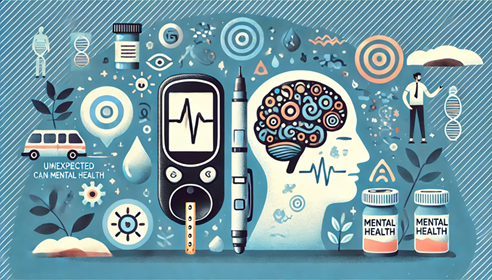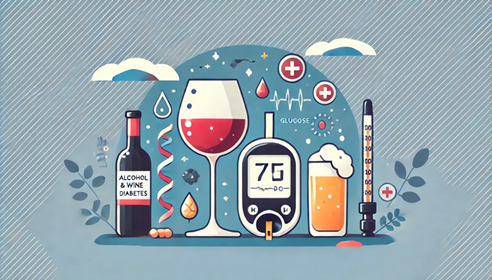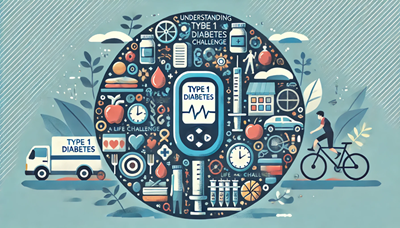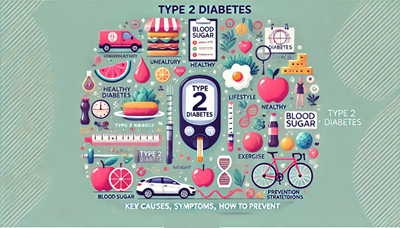How to Lead a Healthy, Balanced Life with Diabetes

Managing Diabetes: A Guide to a Healthy and Balanced Life
Living with diabetes can be challenging, but with the right knowledge and strategies, it is possible to live a healthy and balanced life. In this comprehensive guide, we will explore the various aspects of managing diabetes and provide you with practical tips to help you navigate this condition.
From understanding the different types of diabetes and their symptoms to learning about the importance of proper nutrition and exercise, we will delve into all the key factors that can positively impact your diabetes management. Our goal is to empower you with the information you need to take control of your health and live a fulfilling life.
Additionally, we will discuss the latest advancements in diabetes treatment, including medications and devices, as well as the importance of regular check-ups and monitoring. Our aim is to provide you with a holistic approach to managing diabetes, taking into account not only physical but also emotional well-being.
Whether you are newly diagnosed or have been living with diabetes for years, this guide will serve as a valuable resource to help you navigate the challenges and achieve a healthy and balanced life.
Welcome to your journey towards optimal diabetes management.
Understanding Diabetes: Types, Causes, and Symptoms
Diabetes is a chronic condition that occurs when the body cannot effectively regulate blood sugar (glucose) levels. There are primarily three types of diabetes: Type 1, Type 2, and gestational diabetes. Type 1 diabetes is an autoimmune condition where the body attacks insulin-producing cells in the pancreas. This type generally appears in childhood or adolescence but can develop in adults as well. Individuals with Type 1 diabetes require insulin therapy for life, as their bodies do not produce this essential hormone.
Type 2 diabetes is the most common form of the disease, typically developing in adults, although it is increasingly seen in children and adolescents due to rising obesity rates. In Type 2 diabetes, the body becomes resistant to insulin or does not produce enough insulin to maintain normal glucose levels. This type can often be managed with lifestyle changes, oral medications, and sometimes insulin. Lastly, gestational diabetes occurs during pregnancy and usually resolves after childbirth, but it increases the risk of developing Type 2 diabetes later in life for both mother and child.
Recognizing the symptoms of diabetes is crucial for early diagnosis and management. Common symptoms include frequent urination, increased thirst, extreme fatigue, blurred vision, and slow-healing wounds or infections. Many people with Type 2 diabetes may not exhibit symptoms initially, making regular check-ups essential for early detection. Being aware of the risk factors, including family history, age, obesity, and sedentary lifestyle, can help identify individuals who may be at higher risk for developing diabetes.
Importance of Managing Diabetes
Managing diabetes effectively is vital for maintaining overall health and preventing complications. When blood sugar levels are not well controlled, it can lead to serious health issues, including heart disease, kidney failure, nerve damage, and vision problems. By actively managing diabetes, individuals can significantly reduce their risk of these complications and improve their quality of life. Effective management not only helps to stabilize blood sugar levels but also contributes to emotional well-being and a more fulfilling lifestyle.
Moreover, the importance of managing diabetes extends beyond the individual. Uncontrolled diabetes can lead to increased healthcare costs and burden on the healthcare system. By adhering to a management plan, individuals can help alleviate some of the pressures on healthcare resources, making it a community-wide concern. Awareness and education about diabetes management can lead to healthier communities where individuals support each other in their health journeys.
In addition, managing diabetes empowers individuals to take control of their health. With the right knowledge and tools, people can make informed decisions about their diet, exercise, and medication adherence. This proactive approach fosters a sense of independence and confidence, enabling individuals to lead active lives despite their diagnosis. It’s essential to recognize that managing diabetes is not merely a medical obligation but a pathway to a healthier, more balanced life.
Diabetes Management Statistics
Understanding diabetes management statistics can provide insight into the effectiveness of various strategies and highlight the challenges faced by individuals living with diabetes. According to the Centers for Disease Control and Prevention (CDC), approximately 34.2 million Americans, or 10.5% of the population, have diabetes. Among these, only 7.2 million people are undiagnosed, emphasizing the importance of regular screenings and awareness campaigns.
Moreover, research indicates that proper diabetes management can lead to improved outcomes. For instance, individuals who maintain their Hemoglobin A1c levels below 7% significantly reduce their risk of complications. Studies show that for every 1% reduction in A1c, there is a 21% decrease in the risk of diabetes-related complications, such as heart disease and stroke. These statistics underscore the critical role of effective blood sugar management in reducing health risks associated with diabetes.
Additionally, disparities in diabetes management must be addressed. Minority groups and lower-income populations often face higher rates of diabetes and complications due to limited access to healthcare resources, education, and healthy food options. Understanding these statistics is crucial for developing targeted programs and interventions that can help bridge the gap in diabetes care and support affected communities in achieving better health outcomes.
Creating a Diabetes Management Plan
A well-structured diabetes management plan is essential for maintaining optimal health and preventing complications. The first step in creating this plan involves collaboration with healthcare professionals, including doctors, dietitians, and diabetes educators. These experts can provide personalized recommendations based on individual health needs, lifestyle, and preferences. A comprehensive management plan typically includes glucose monitoring, medication management, dietary guidelines, and physical activity recommendations.
Monitoring blood sugar levels is a cornerstone of diabetes management. Individuals should learn how to check their blood glucose levels regularly and understand how food, exercise, stress, and medications affect their readings. Keeping a log of these levels can help identify patterns and inform necessary adjustments in the management plan. Additionally, healthcare providers may recommend continuous glucose monitoring (CGM) devices for individuals with more complex needs, which can provide real-time data for better decision-making.
Diet and exercise are also integral components of a diabetes management plan. A registered dietitian can assist in creating a balanced meal plan that emphasizes whole foods, healthy fats, and lean proteins while minimizing processed foods and sugars. Regular physical activity not only helps in managing blood sugar levels but also contributes to overall health and well-being. Setting specific, achievable goals for diet and exercise can motivate individuals to stay committed to their management plan and promote long-term success.
Healthy Eating for Diabetes: A Balanced Diet and Meal Planning
Adopting a healthy eating pattern is one of the most effective ways to manage diabetes. A balanced diet helps regulate blood sugar levels and provides essential nutrients for overall health. The focus should be on whole foods, including fruits, vegetables, whole grains, lean proteins, and healthy fats. These foods not only provide critical vitamins and minerals but also help maintain a feeling of fullness, which is beneficial for weight management.
Meal planning plays a vital role in diabetes management. By preparing meals in advance, individuals can make healthier choices and avoid impulsive eating. It’s helpful to create a weekly meal schedule that includes a variety of foods to ensure a well-rounded nutrient intake. Incorporating carbohydrate counting can also be beneficial, as it allows individuals to understand how different foods affect their blood sugar levels. Tools like food diaries or mobile apps can assist in tracking carbohydrate intake and making informed choices.
Portion control is another essential aspect of healthy eating for diabetes. Understanding serving sizes can help prevent overeating and maintain stable blood sugar levels. Utilizing measuring cups or a food scale can assist in accurately portioning meals. Additionally, being mindful of the timing of meals and snacks is important, as regular eating patterns can help maintain consistent glucose levels throughout the day. By focusing on these principles, individuals with diabetes can enjoy a varied and satisfying diet while effectively managing their condition.
Regular Physical Activity and Exercise for Diabetes Management
Regular physical activity is a cornerstone of diabetes management. Engaging in consistent exercise helps improve insulin sensitivity, allowing the body to use glucose more effectively. This can lead to better blood sugar control, weight management, and reduced risk of cardiovascular disease. The American Diabetes Association recommends that individuals with diabetes aim for at least 150 minutes of moderate-intensity aerobic exercise per week, spread throughout the week.
Incorporating strength training into the exercise routine is also beneficial. Resistance training helps build muscle, which can enhance metabolism and improve insulin sensitivity. A well-rounded fitness regimen can include activities such as walking, cycling, swimming, or group fitness classes. Finding activities that are enjoyable can help ensure adherence to a regular exercise routine, making it easier to stay motivated over time.
It’s important for individuals with diabetes to consult with their healthcare provider before starting any new exercise program, especially if they have other health concerns. Monitoring blood sugar levels before and after exercise is crucial, as physical activity can affect glucose levels. Individuals may need to adjust their food intake or medication accordingly, ensuring a safe and effective approach to exercise. By prioritizing physical activity, individuals with diabetes can enhance their overall health and well-being.
Monitoring Blood Sugar Levels and Medication Management
Monitoring blood sugar levels is a critical aspect of managing diabetes. Regular glucose checks provide insights into how well the current management plan is working and allow for timely adjustments. Individuals should work with their healthcare team to determine the appropriate frequency of monitoring, which can vary based on treatment plans and daily activities. For some, continuous glucose monitoring (CGM) systems may be recommended, offering real-time data and alerts for fluctuations in blood sugar levels.
In addition to monitoring, medication management plays a vital role in diabetes care. Depending on the type of diabetes and individual needs, various medications may be prescribed, including insulin and oral hypoglycemics. Understanding how these medications work, their potential side effects, and the importance of adherence is crucial for effective management. Regular consultations with healthcare providers can help individuals stay informed about their treatment options and make necessary adjustments based on their progress.
It’s essential to keep an updated medication list and communicate with healthcare providers about any changes in symptoms or side effects. Individuals should also be educated about recognizing signs of high or low blood sugar levels and how to respond appropriately. Establishing a routine for medication administration and monitoring can help ensure that individuals manage their diabetes effectively and maintain stable blood sugar levels.
Managing Stress and Mental Health with Diabetes
Living with diabetes can be emotionally taxing, and managing stress is vital for overall health. Stress can lead to fluctuations in blood sugar levels, making it essential to develop effective coping strategies. Techniques such as mindfulness, yoga, and deep-breathing exercises can help reduce stress and promote relaxation. Engaging in hobbies, spending time with loved ones, and ensuring adequate rest can also contribute to emotional well-being.
Additionally, it’s important to recognize the link between diabetes and mental health conditions such as depression and anxiety. Individuals with diabetes may experience feelings of frustration, isolation, or worry about their health, which can impact their ability to manage their condition. Seeking support from mental health professionals can provide valuable resources and coping strategies for managing these feelings. Many communities offer support groups for individuals with diabetes, creating a sense of connection and shared understanding.
Open communication with healthcare providers about emotional health is crucial. Regular check-ins can help identify any mental health concerns and ensure comprehensive care. By addressing both physical and emotional aspects of diabetes management, individuals can lead healthier, more balanced lives. It’s essential to remember that seeking help is a sign of strength, and prioritizing mental health is just as important as managing physical health.
Support and Resources for Diabetes Management
Access to support and resources is essential for effective diabetes management. Numerous organizations offer educational materials, workshops, and community support for individuals living with diabetes. The American Diabetes Association, for example, provides a wealth of information on diabetes management, including articles, webinars, and local support groups. Utilizing these resources can empower individuals with the knowledge they need to manage their condition effectively.
In addition to national organizations, local community health centers and hospitals often offer diabetes education programs and resources. Participating in these programs can provide valuable insights into managing diabetes while connecting individuals with others facing similar challenges. Many communities also host events, such as health fairs or workshops, focused on diabetes awareness and education. Engaging with these resources can help individuals stay informed about the latest advancements in diabetes care.
Online resources, including forums and social media groups, can provide additional support and a sense of community. Connecting with others who understand the daily challenges of diabetes can help individuals feel less isolated and more motivated to adhere to their management plans. Sharing experiences and tips can foster a supportive environment, enhancing overall well-being and resilience in the face of diabetes management.
Conclusion: Living a Healthy and Balanced Life with Diabetes
Living with diabetes does not mean sacrificing quality of life. With the right management strategies, individuals can lead fulfilling and balanced lives. Understanding the condition, creating a personalized management plan, and prioritizing healthy eating and physical activity are essential components of effective diabetes care. Moreover, addressing mental health and seeking support can further enhance the journey toward well-being.
As advancements in diabetes treatment continue to emerge, staying informed and proactive is crucial. Regular consultations with healthcare providers, participation in educational programs, and utilization of community resources can significantly impact diabetes management. It’s essential to remember that managing diabetes is a long-term commitment, but with determination and support, individuals can overcome challenges and thrive.
Empowerment through knowledge and community support can transform the way individuals experience diabetes. By embracing a holistic approach to managing the condition, individuals can take control of their health and enjoy a vibrant, active lifestyle. Ultimately, living a healthy and balanced life with diabetes is not only possible but achievable with the right tools and mindset.

